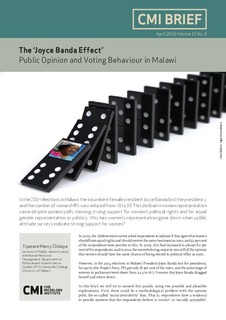The ‘Joyce Banda Effect’: Public Opinion and Voting Behaviour in Malawi
Report
Permanent lenke
http://hdl.handle.net/11250/2475340Utgivelsesdato
2016-04-01Metadata
Vis full innførselSamlinger
- Publications [1482]
Originalversjon
Bergen: Chr. Michelsen Institute (CMI Brief vol. 15 no. 6) 4 p.Sammendrag
In the 2014 elections in Malawi, the incumbent female president Joyce Banda lost the presidency, and the number of women MPs was reduced from 43 to 33. This decline in women representation came despite opinion polls showing strong support for women’s political rights and for equal gender representation in politics. Why has women’s representation gone down when public attitude surveys indicate strong support for women? In 2003, the Afrobarometer survey asked respondents to indicate if they agree that women should have equal rights and should receive the same treatment as men, and 52 per cent of the respondents were positive to this. In 2005, this had increased to almost 80 per cent of the respondents, and in 2012 the overwhelming majority was still of the opinion that women should have the same chance of being elected to political office as men. However, in the 2014 elections in Malawi, President Joyce Banda lost the presidency, her party (the People’s Party , PP) got only 18 per cent of the votes, and the percentage of women in parliament went down from 22.3 to 16.7. It seems that Joyce Banda dragged herself and others down. In this brief, we will try to unravel this puzzle, using two possible and plausible explanations. First, there could be a methodological problem with the opinion polls, the so-called ‘social desirability’ bias. That is, respondents have a tendency to provide answers that the respondents believe is ‘correct’ or ‘socially acceptable’. Secondly, it could be a problem of ‘role-modelling’: the performance of a particular representative has a tendency of shaping public opinion and future attitudes on that representative and on what he/she represents. That is, the failure of the woman president may have brought down the popularity also of other women politicians. Stable Opinion and ‘Yeah-saying’ In order to assess whether
